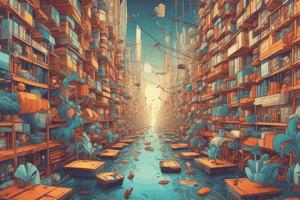Podcast
Questions and Answers
Apa peran konsumen dalam perekonomian?
Apa peran konsumen dalam perekonomian?
- Menentukan harga dan produksi melalui keputusan pembelian (correct)
- Menghasilkan barang dan jasa untuk dijual
- Mengelola sumber daya untuk menciptakan lapangan kerja
- Mengirimkan barang dan jasa ke pasar
Siapa yang bertanggung jawab atas sisi suplai perekonomian?
Siapa yang bertanggung jawab atas sisi suplai perekonomian?
- Produsen (correct)
- Pemerintah
- Distributor
- Konsumen
Apa komponen ekonomi yang dipengaruhi oleh keputusan pembelian konsumen?
Apa komponen ekonomi yang dipengaruhi oleh keputusan pembelian konsumen?
- Jumlah lapangan kerja
- Jumlah pengangguran
- Kualitas dan kuantitas
- Harga dan produksi (correct)
Apa yang dilakukan produsen untuk menghasilkan barang dan jasa?
Apa yang dilakukan produsen untuk menghasilkan barang dan jasa?
Siapa yang mempengaruhi permintaan barang dan jasa?
Siapa yang mempengaruhi permintaan barang dan jasa?
Apa peran produsen dalam perekonomian?
Apa peran produsen dalam perekonomian?
Siapa yang membeli barang dalam jumlah besar dari produsen dan menjualnya ke retailer?
Siapa yang membeli barang dalam jumlah besar dari produsen dan menjualnya ke retailer?
Apa yang dimaksud dengan 'invisible hand' dalam teori ekonomi?
Apa yang dimaksud dengan 'invisible hand' dalam teori ekonomi?
Siapa yang memainkan peran penting dalam sistem pasar?
Siapa yang memainkan peran penting dalam sistem pasar?
Apa tujuan dari interaksi antara distributor dengan entitas yang mempengaruhi lingkungan bisnis?
Apa tujuan dari interaksi antara distributor dengan entitas yang mempengaruhi lingkungan bisnis?
Flashcards are hidden until you start studying
Study Notes
Economic Actors: Understanding the Roles of Consumers, Producers, and Distributors
Economic actors, also known as economic agents or economic players, are individuals or organizations that engage in economic activities. These activities can be categorized into four essential areas: production, consumption, distribution, and exchange. Economic actors can be further divided into consumers, producers, and distributors. Understanding the roles of these economic actors is crucial for comprehending the workings of an economy.
Consumers
Consumers, also known as households or individuals, are the primary economic actors who purchase goods and services to satisfy their needs and wants. They are responsible for the demand side of the economy, influencing prices and production through their purchasing decisions. Consumers impact the economy by driving demand for goods and services, which in turn affects the prices of these products. Additionally, consumers' labor supply affects production, as businesses rely on labor to create goods and services.
Producers
Producers are organizations that produce goods and services to sell to make a profit. They are responsible for the supply side of the economy, influencing prices and production through their production decisions. Producers use labor, capital, land, and entrepreneurship to create goods and services, which they then sell to consumers. The production process is essential for economic growth and development, as it creates jobs, generates income, and provides goods and services to consumers. Producers also impact the economy by influencing demand for inputs, as they require raw materials, energy, and other resources to produce goods and services.
Distributors
Distributors play a crucial role in the economy by facilitating the flow of goods and services from producers to consumers. They act as intermediaries, buying goods from producers and selling them to consumers, retailers, or other intermediaries. Distributors can be categorized into wholesalers and retailers. Wholesalers buy goods in bulk from producers and sell them to retailers, who then sell the goods to consumers. Retailers can also buy directly from producers or import goods from other countries.
Distributors also play a role in the market system, which includes direct market players such as producers, buyers, and consumers, as well as suppliers of supporting goods and services, and entities that influence the business environment. Infrastructure providers, regulatory agencies, and industry associations are examples of entities that influence the business environment, and distributors interact with these entities to ensure the smooth flow of goods and services in the market system.
The Invisible Hand
The concept of the invisible hand is an essential aspect of economic theory, representing the idea that self-interested individuals can produce what is socially necessary and beneficial for all. The invisible hand is the automatic pricing and distribution mechanisms in the economy that interact directly and indirectly with centralized, top-down planning authorities. It helps to create an equilibrium in the market, where supply and demand find a natural balance, and oversupply and shortages are avoided.
In conclusion, economic actors, including consumers, producers, and distributors, play a crucial role in the functioning of economies. Understanding their roles and interactions is essential for comprehending the workings of a market economy and for designing effective economic policies.
Studying That Suits You
Use AI to generate personalized quizzes and flashcards to suit your learning preferences.




